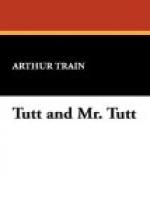Babson and O’Brien had won.
Once more Mr. Tutt struggled against his fate. Was Mr. Walsh sure he had no prejudices against Italians or foreigners generally? Quite. Did he know anyone connected with the case? No. Had he any objection to the infliction of capital punishment? None whatever. The defense had exhausted all its challenges. Mr. Tutt turned to the prospective foreman with an endearing smile.
“Mr. Walsh,” said he in caressing tones, “you are precisely the type of man in whom I feel the utmost confidence in submitting the fate of my client. I believe that you will make an ideal foreman I hardly need to ask you whether you will accord the defendant the benefit of every reasonable doubt, and if you have such a doubt will acquit him.”
Mr. Walsh gazed suspiciously at Mr. Tutt.
“Sure,” he responded dryly, “Oi’ll give him the benefit o’ the doubt, but if Oi think he’s guilty Oi’ll convict him.”
Mr. Tutt shivered.
“Of course! Of course! That would be your duty! You are entirely satisfactory, Mr. Walsh!”
“Mr. Walsh is more than satisfactory to the prosecution!” intoned O’Brien.
“Be sworn, Mr. Walsh,” directed the clerk; and the filling of the jury box in the memorable case of People versus Serafino was begun.
“That chap doesn’t like us,” whispered Mr. Tutt to Tutt. “I laid it on a bit too thick.”
In fact, Mr. Walsh had already entered upon friendly relations with Mr. O’Brien, and as the latter helped him arrange a place for his hat and coat the foreman cast a look tinged with malevolence at the defendant and his counsel, as if to say “You can’t fool me. I know the kind of tricks you fellows are all up to.”
O’Brien could not repress a grin. The clerk drew forth another name.
“Mr. Tompkins—will you take the chair?”
Swiftly the jury was impaneled. O’Brien challenged everybody who did not suit his fancy, while Tutt & Tutt sat helpless.
Ten minutes and the clerk called the roll, beginning with Mr. Walsh, and they were solemnly sworn a true verdict to find, and settled themselves to the task.
The mills of the gods had begun to grind, and Angelo was being dragged to his fate as inexorably and as surely, with about as much chance of escape, as a log that is being drawn slowly toward a buzz saw.
“You may open the case, Mr. O’Brien,” announced Judge Babson, leaning back and wiping his glasses.
Then surreptitiously he began to read his mail as his fellow conspirator undertook to tell the jury what it was all about. One by one the witnesses were called—the coroner’s physician, the policeman who had arrested Angelo outside the barber shop with the smoking pistol in his hand, the assistant barber who had seen the shooting, the customer who was being shaved. Each drove a spike into poor Angelo’s legal coffin. Mr. Tutt could not shake them. This evidence was plain. He had come into the shop, accused Crocedoro of making his wife’s life unbearable and—shot him.




